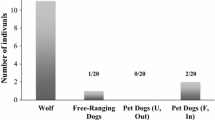Abstract
Domestic dogs’ (Canis lupus familiaris) socio-cognitive faculties have made them highly sensitive to human social cues. While dogs often excel at understanding human communicative gestures, they perform comparatively poorly in problem-solving and physical reasoning tasks. This difference in their behaviour could be due to the lifestyle and intense socialization, where problem solving and physical cognition are less important than social cognition. Free-ranging dogs live in human-dominated environments, not under human supervision and are less socialized. Being scavengers, they often encounter challenges where problem solving is required in order to get access to food. We tested Indian street dogs in familiar and unfamiliar independent solvable tasks and quantified their persistence and dependence on a novel human experimenter, in addition to their success in solving a task. Our results indicate that free-ranging dogs succeeded and persisted more in the familiar task as compared to the unfamiliar one. They showed negligible amount of human dependence in the familiar task, but showed prolonged gazing and considerable begging behaviour to the human experimenter in the context of the unfamiliar task. Cognitive abilities of free-ranging dogs thus play a pivotal role in determining task-associated behaviours based on familiarity. In addition to that, these dogs inherently tend to socialize with and depend on humans, even if they are strangers. Our results also illustrate free-ranging dogs’ low competence at physical cognitive tasks.




Similar content being viewed by others
References
Bhadra A, Bhadra A (2014) Preference for meat is not innate in dogs. J Ethol 32:15–22
Boitani L, Ciucci P (1995) Comparative social ecology of feral dogs and wolves. Ethol Ecol Evol 7:49–72
Brubaker L, Dasgupta S, Bhattacharjee D et al (2017) Differences in problem-solving between canid populations: do domestication and lifetime experience affect persistence? Anim Cogn. doi:10.1007/s10071-017-1093-7
Cafazzo S, Valsecchi P, Bonanni R, Natoli E (2010) Dominance in relation to age, sex, and competitive contexts in a group of free-ranging domestic dogs. Behav Ecol 21:443–455
D’Aniello B, Scandurra A (2016) Ontogenetic effects on gazing behaviour: a case study of kennel dogs (Labrador Retrievers) in the impossible task paradigm. Anim Cogn 19:565–570
Debroy B (2008) Sarama and her children: the dog in Indian myth. Penguinn, London
Gácsi M, Gyoöri B, Virányi Z et al (2009) Explaining dog wolf differences in utilizing human pointing gestures: selection for synergistic shifts in the development of some social skills. PLoS ONE 4:e6584
Gaunet F (2008) How do guide dogs of blind owners and pet dogs of sighted owners (Canis familiaris) ask their owners for food? Anim Cogn 11:475–483
Gompper ME (2013) The dog–human–wildlife interface. In: Free-ranging dogs and wildlife conservation. Oxford University Press, Oxford, pp 9–54
Hare B, Tomasello M (1999) Domestic dogs (Canis familiaris) use human and conspecific social cues to locate hidden food. J Comp Psychol 113:173–177
Hughes J, Macdonald DW (2013) A review of the interactions between free-roaming domestic dogs and wildlife. Biol Cons 157:341–351
Marshall-Pescini S, Prato-Previde E, Valsecchi P (2011) Are dogs (Canis familiaris) misled more by their owners than by strangers in a food choice task? Anim Cogn 14:137–142
Miklósi Á, Kubinyi E, Topál J et al (2003) A simple reason for a big difference. Curr Biol 13:763–766
Miklösi Á, Polgárdi R, Topál J, Csányi V (1998) Use of experimenter-given cues in dogs. Anim Cogn 1:113–121
Nagasawa M, Mitsui S, En S et al (2015) Oxytocin-gaze positive loop and the coevolution of human–dog bonds. Science 80(348):333–336
Osthaus B, Lea SEG, Slater AM (2005) Dogs (Canis lupus familiaris) fail to show understanding of means-end connections in a string-pulling task. Anim Cogn 8:37–47
Paul M, Sen Majumder S, Sau S et al (2016) High early life mortality in free-ranging dogs is largely influenced by humans. Sci Rep 6:19641
Pilot M, Malewski T, Moura AE et al (2015) On the origin of mongrels: evolutionary history of free-breeding dogs in Eurasia. Proc R Soc B Biol Sci 282:20152189
Scandurra A, Prato-Previde E, Valsecchi P et al (2015) Guide dogs as a model for investigating the effect of life experience and training on gazing behaviour. Anim Cogn 18:937–944
Sen Majumder S, Bhadra A, Ghosh A et al (2014) To be or not to be social: foraging associations of free-ranging dogs in an urban ecosystem. Acta Ethol 17:1–8
Shannon LM, Boyko RH, Castelhano M et al (2015) Genetic structure in village dogs reveals a Central Asian domestication origin. Proc Natl Acad Sci 112:13639–13644
Topál J, Miklósi Á, Csányi V (1997) Dog–human relationship affects problem solving behavior in the dog. Anthrozoos A Multidiscip J Interact People Anim 10:214–224
Udell MAR (2015) When dogs look back: inhibition of independent problem-solving behaviour in domestic dogs (Canis lupus familiaris) compared with wolves (Canis lupus). Biol Let 11:20150489
Udell MAR, Giglio RF, Wynne CDL (2008) Domestic dogs (Canis familiaris) use human gestures but not nonhuman tokens to find hidden food. J Comp Psychol 122:84–93
Vanak AT, Gompper ME (2009) Dietary niche separation between sympatric free-ranging domestic dogs and indian foxes in central India. J Mammal 90:1058–1065
Virányi Z, Gácsi M, Kubinyi E et al (2008) Comprehension of human pointing gestures in young human-reared wolves (Canis lupus) and dogs (Canis familiaris). Anim Cogn 11:373–387
Acknowledgements
SD, DB, JD, ArB, SG and NDN carried out the experiments, and DB analysed the data. MU designed the unfamiliar task protocol and contributed to the experimental discussion. AB supervised the work and co-wrote the paper with DB. This study was partially supported by the SERB Women’s Excellence Award to AB (SB/WEA-005/2013). DB was supported by a DST INSPIRE Fellowship; SD was supported by KVPY Scholarship; ArB and JD were supported by DST INSPIRE SHE. NDN was supported by the IASc-INSA-NASI Summer Research Fellowship programme; SG was supported by the Indian Institute of Science Education and Research—Kolkata (IISER Kolkata) Summer Fellowship programme. MU received no funding for the study. We thank Mr. Shubhra Sau and Ms. Ankurita Mondal for helping with the video recording for some of the trials. We thank IISER Kolkata for providing infrastructural support for this work.
Author information
Authors and Affiliations
Corresponding author
Ethics declarations
Conflict of interest
The authors declare that they have no conflict of interest regarding this study.
Ethical approval
All procedures performed in studies involving animals were in accordance with the ethical standards of Indian Institute of Science Education and Research—Kolkata (approval no. 1385/ac/10/CPCSEA). All meat used in the experiment was fresh and fit for human consumption.
Electronic supplementary material
Below is the link to the electronic supplementary material.
Supplementary material 1 (AVI 14692 kb)
Supplementary material 2 (AVI 15362 kb)
Rights and permissions
About this article
Cite this article
Bhattacharjee, D., Dasgupta, S., Biswas, A. et al. Practice makes perfect: familiarity of task determines success in solvable tasks for free-ranging dogs (Canis lupus familiaris). Anim Cogn 20, 771–776 (2017). https://doi.org/10.1007/s10071-017-1097-3
Received:
Revised:
Accepted:
Published:
Issue Date:
DOI: https://doi.org/10.1007/s10071-017-1097-3




